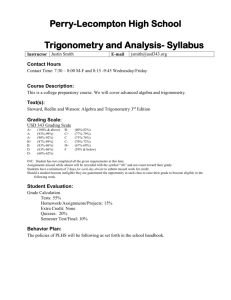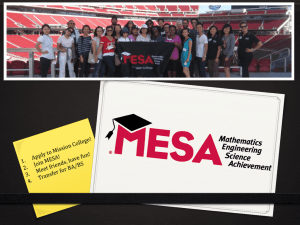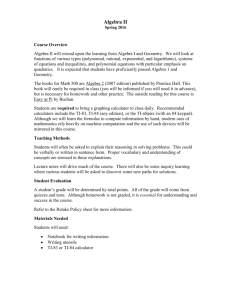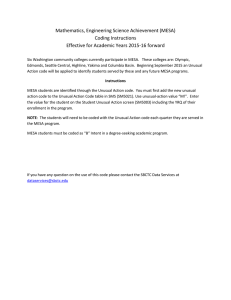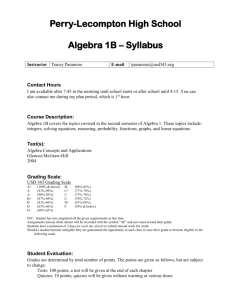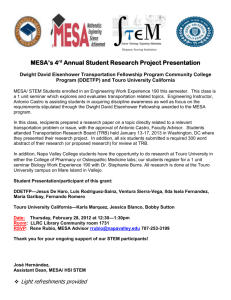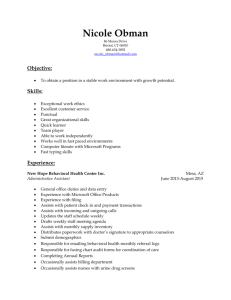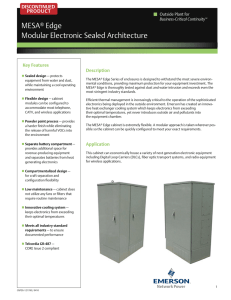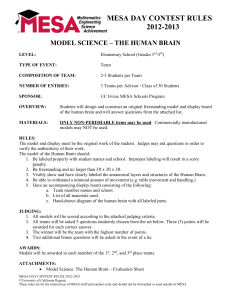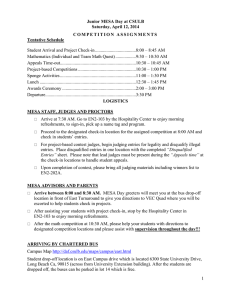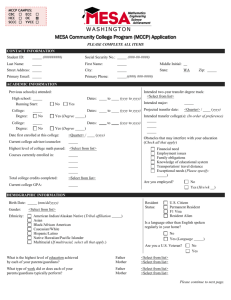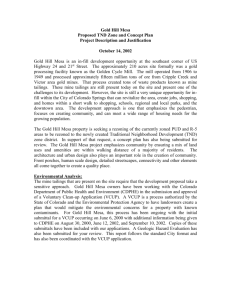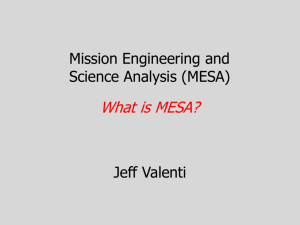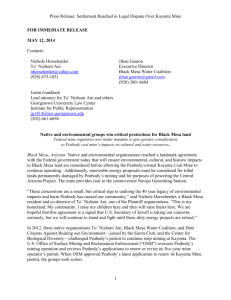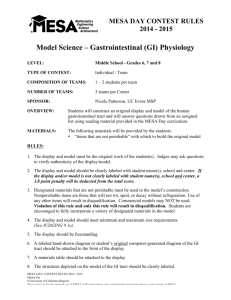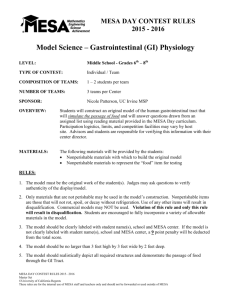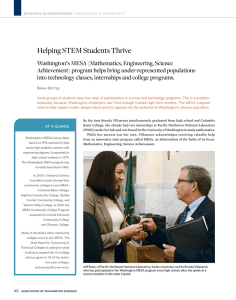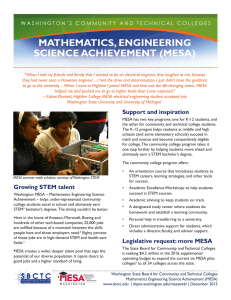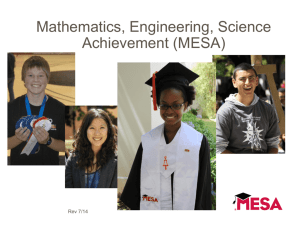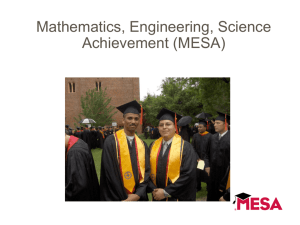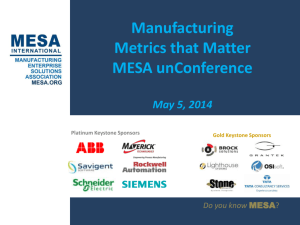Albemarle High School 2012/2013 Math, Engineering, and Science
advertisement
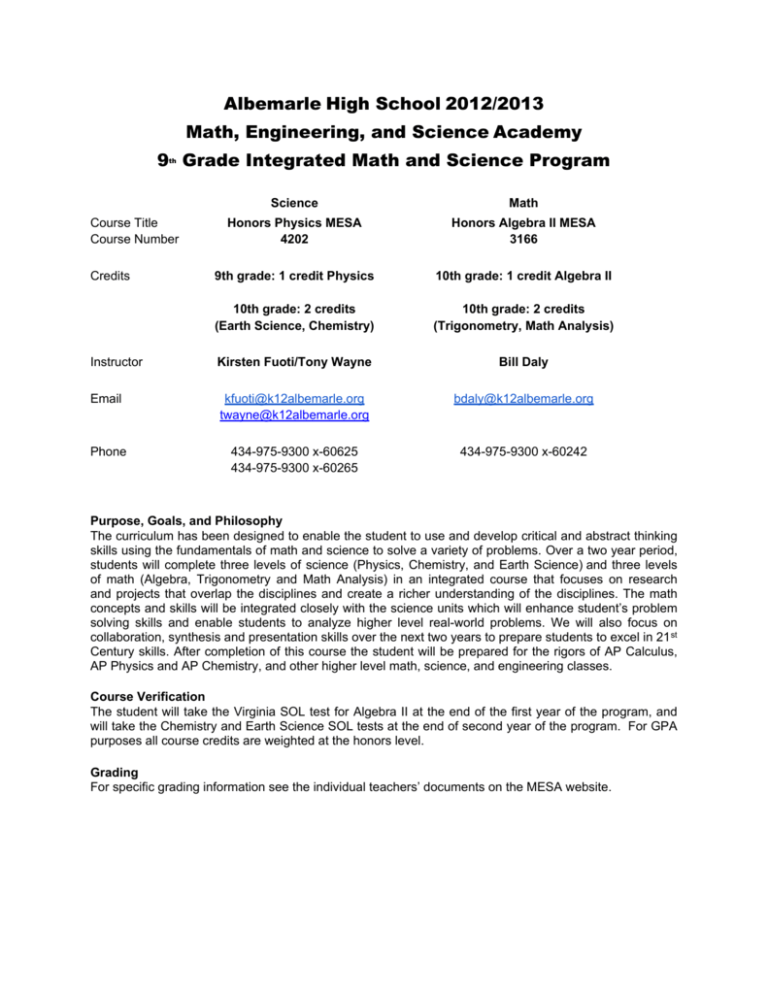
Albemarle High School 2012/2013 Math, Engineering, and Science Academy 9 Grade Integrated Math and Science Program th Science Math Honors Physics MESA 4202 Honors Algebra II MESA 3166 9th grade: 1 credit Physics 10th grade: 1 credit Algebra II 10th grade: 2 credits (Earth Science, Chemistry) 10th grade: 2 credits (Trigonometry, Math Analysis) Instructor Kirsten Fuoti/Tony Wayne Bill Daly Email kfuoti@k12albemarle.org twayne@k12albemarle.org bdaly@k12albemarle.org Phone 434-975-9300 x-60625 434-975-9300 x-60265 434-975-9300 x-60242 Course Title Course Number Credits Purpose, Goals, and Philosophy The curriculum has been designed to enable the student to use and develop critical and abstract thinking skills using the fundamentals of math and science to solve a variety of problems. Over a two year period, students will complete three levels of science (Physics, Chemistry, and Earth Science) and three levels of math (Algebra, Trigonometry and Math Analysis) in an integrated course that focuses on research and projects that overlap the disciplines and create a richer understanding of the disciplines. The math concepts and skills will be integrated closely with the science units which will enhance student’s problem solving skills and enable students to analyze higher level real-world problems. We will also focus on collaboration, synthesis and presentation skills over the next two years to prepare students to excel in 21 st Century skills. After completion of this course the student will be prepared for the rigors of AP Calculus, AP Physics and AP Chemistry, and other higher level math, science, and engineering classes. Course Verification The student will take the Virginia SOL test for Algebra II at the end of the first year of the program, and will take the Chemistry and Earth Science SOL tests at the end of second year of the program. For GPA purposes all course credits are weighted at the honors level. Grading For specific grading information see the individual teachers’ documents on the MESA website. Supplies (1) Every MESA student will receive a laptop. Please Note: Students will be required to sign a separate policy agreement for computer and internet usage form before they are issued a computer. (2) Students are required to have a graphing calculator. If a student is thinking about buying a graphing calculator, we recommend a TI-83, TI-83 plus, TI-84 plus or TI-84 Plus silver edition. Classroom calculators will also be available. (3) Spiral or composition notebook. Problem solutions and class notes will go in this notebook. Homework that is done on the handouts/worksheets will not be accepted unless the instructions say to do it on this piece of paper. The notebook does not need to be new. It can be an old spiral notebook. Zero Credit While we recognize that a student does not learn at a zero rate, it is possible to produce at a zero rate. Homework is either completed on time or it is not and incomplete or missing homework will be recorded as a zero. In the event a student is absent on a day an assignment is due, our expectation is they will try to complete the assignment from home. However, they will be given the same length of time to complete the assignment as the other students without penalty. Communication The best way to communicate with us is through email. Typically responses will be within 2 business days. We will contact parents directly when a child is in danger of failing or struggling. A MESA Newsletter will be emailed monthly with updates on the school year and student opportunities. The MESA website is also a good resource. Class Communications The instructors will update an online class log on Googledocs which includes assignments, summary of the daily lessons, announcements, and dates for upcoming tests/quizzes. A link to the class log can also be found in the MESA website. Classroom policies and expectations As maturing individuals you will understand that your actions and behavior do and will have consequences. As young adults and as high school students certain behaviors and attitudes are expected. You are expected to be in class at your desk on time. You are expected to maintain your own school supplies - paper and writing instrument. You are expected to be respectful to your classmates and instructor. You are expected to use appropriate language. You are expected to be work safely so that you and your classmates are not injured. You are expected to clean up after yourself. You are expected to be an advocate for yourself in your education. You are expected to conduct your business before and after class and not during class. It is expected that you have a desire to learn. Any consistent deviations from expectations will be addressed. Usually this will consist of a warning, a call home and as a last resort referral to the administration. Absent and tardy policies are discussed in your AHS handbook, and you should make it a point to familiarize yourself with these as well as many of the other policies that will affect you this coming year. Course Objectives Math Year One, Semester I ● Problem Solving, Evaluating Expressions, Functions Relations and Transformations, Describing Data ● Vectors, Basic Trigonometry ● Quadratic Functions ● Systems of Equations and Matrix Operations ● Polynomial Functions Year One, Semester II ● Radical and Rational Functions ● Exponents, Growth, Decay, Logarithims ● Patterns and Recursions, Sequences and Series, Rational Functions ● Series & Sequences, Probability & Statistics Science Year One Semester I How to think like a scientist/engineer… ● Scientific thinking / Problem solving ● Measurement with SI units ● Measured and Derived Number Format (Significant Figures and Uncertainty) ● Dimensional and Expression of Accuracy and Precision ● Graphical Analysis Motion & Forces ● Displacement, Time, Instantaneous and Average Speed, Velocity, Acceleration, Gravity and Free Fall, Projectile Motion, Graphing ● Forces, Vector Math, Newton’s Laws, Friction, Force Equilibrium, ● Circular motion, Gravitation, Planetary Motion, Satellite Global Positioning Systems Year One Semester II Energy & Momentum ● Work and Energy, Conservation Laws, Internal Energy, Kinetic vs. Potential ● Elastic vs Inelastic Momentum, Momentum Conservation & Exchange Torque ● Rigid Objects in Equilibrium, Center of Mass Electricity & Magnetism ● Electrostatics ● Voltage, Current, Resistance, & Capacitance ● Ohm’s Law and basic Circuit Analysis ● Magnetic Forces The Universe ● Origins of the Solar System, Galaxies, and the Universe ● Solar Systems (ours and others) ● Astronomy and Space exploration The Solid Earth ● Earth's Structure and composition ● Plate Tectonics ● Geology ● Earthquakes and Volcanoes
